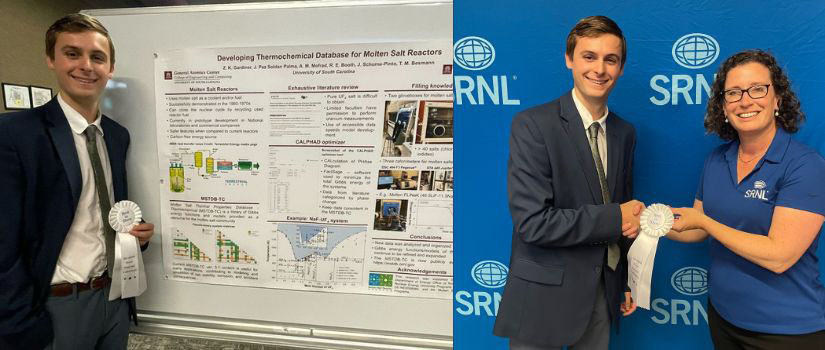Sophomore impresses with presenting nuclear engineering research at national conference.
For sophomore Zachary Gardiner, an Honors College student, chemical engineering major and nuclear engineering minor, his research experience began even before entering a classroom at the Molinaroli College of Engineering and Computing.
Gardiner met Mechanical Engineering Professor and SmartState Chair Theodore Besmann at an admitted students’ day event in 2023. Besmann says he was impressed by Gardiner’s eagerness to join the research team.
“I said he could start as soon as he got here. Sure enough, he showed up the first week, so we put him to work,” Besmann says.
Gardiner received the prestigious Best in Show award this past October at the Savannah River National Laboratory’s University Research Poster Session. His presentation showcased his work with Besmann’s group studying molten salt nuclear reactors. Gardiner was the only underclassman in attendance at the session.
“I was thinking, ‘Oh my gosh, these guys are writing their thesis right now. There’s no way I’m going to win this,’” Gardiner says. “Then I won, which was definitely surprising.”
Molten salt reactors are a promising area of research in nuclear engineering. Water acts as a coolant for radioactive materials in today’s nuclear reactors. The water then becomes steam, which drives a turbine to generate electricity. But one of the disadvantages of using water as a coolant for the solid fuel rods is that it must be kept under extreme pressure to avoid boiling.
Molten salt reactors use liquid salts containing dissolved fuel and act both as coolant and fuel. These salts are chemically neutral and have high boiling points, which cause them to only evaporate under extremely high temperatures. This allows the reactor to operate under normal pressure, completely avoiding the problem of cooling water boiling off at normal pressures.
“There’s a huge stigma around nuclear energy because of events like Chernobyl,” Gardiner says. “But the things we’re developing are incredibly safe and reliable.”
Besmann’s research team is working to develop a database of how different types of salts behave thermally and react with each other. Gardiner’s work involves searching through past research, reviewing the work and organizing it for database entry. They are also performing experiments to fill in gaps from previous research.
“There’s definitely two sides to it, lab work and computer work, and I get to do both,” Gardiner says.
Outside of the lab, Gardiner is deeply involved in several clubs and student organizations on campus. He serves as comptroller for the University of South Carolina’s student government and is a member of the Theta Tau engineering fraternity. But Gardiner is proudest of his work in the field of vexillology, which is the study of flags. While he lives in Pennsylvania now, he was born in Maryland and remains fascinated with the state’s flag. In 2023, he won the Captain William Driver Award for his research on the history of the Maryland flag.
“It’s the best award you can get as a vexillologist for doing research, so it was really incredible,” Gardiner says.
Gardiner also founded the Gamecock Flag Association, which is an affiliate of the North American Vexillological Association, the largest flag scholarship group in the world.
“I’m going for a STEM degree, but I’m also passionate about history,” Gardiner says. “I’m in chemical engineering, which can be complicated. But the great thing about vexillology is that anybody can do it.”
Besmann says Gardiner’s jack-of-all-trades abilities are outstanding, and his status as a sophomore is not a liability. It shows that he has nowhere to go but up.
“We haven’t taken advantage of his smarts sufficiently yet because he has a lot to learn,” Besmann says. “But I’m impressed with his intelligence and the breadth of his curiosity.”
After graduation, Gardiner hopes to pursue his Ph.D. in nuclear engineering and to continue researching carbon-free energy sources.
“I want to do something that has a positive, significant impact on the world,” Gardiner says. “Nuclear power is awesome; it’s the future of energy in America.”
